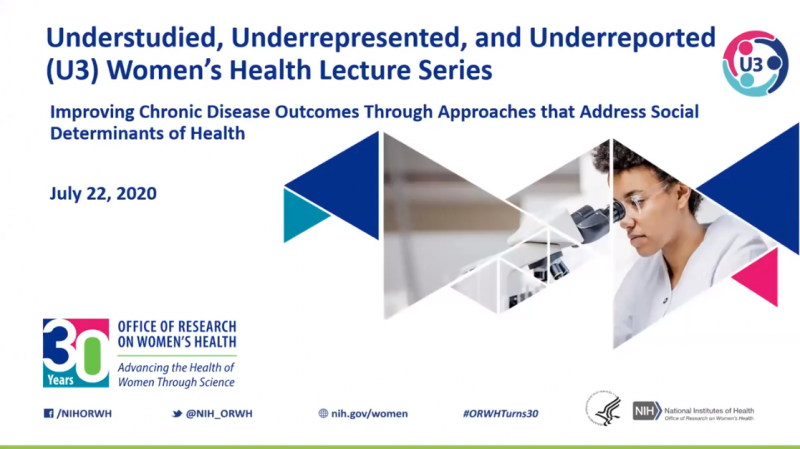 On July 22, 2020, ORWH hosted an online panel discussion titled “Improving Chronic Disease Outcomes Through Approaches that Address Social Determinants of Health.” This webinar was part of ORWH’s Understudied, Underrepresented, and Underreported (U3) Women’s Health Lecture Series. Marie Lynn Miranda, Ph.D., of the University of Notre Dame, and Leah H. Rubin, Ph.D., M.P.H., of Johns Hopkins University and a former Scholar in the NIH Building Interdisciplinary Research Careers in Women’s Health (BIRCWH) program, gave lectures. A moderated Q&A session followed.
On July 22, 2020, ORWH hosted an online panel discussion titled “Improving Chronic Disease Outcomes Through Approaches that Address Social Determinants of Health.” This webinar was part of ORWH’s Understudied, Underrepresented, and Underreported (U3) Women’s Health Lecture Series. Marie Lynn Miranda, Ph.D., of the University of Notre Dame, and Leah H. Rubin, Ph.D., M.P.H., of Johns Hopkins University and a former Scholar in the NIH Building Interdisciplinary Research Careers in Women’s Health (BIRCWH) program, gave lectures. A moderated Q&A session followed.
Dr. Miranda’s lecture, “Assessing Residential Segregation’s Role in Shaping Health and Well-Being,” characterized national and local population patterns as they pertain to race, educational attainment, health care availability, and other factors correlated with health. In particular, she detailed how areas of racial isolation correlate with factors associated with poor health outcomes. She said, “Places that are residentially segregated are less likely to have access to good food sources, are more likely to have higher crime, [and] are more likely to have lower income.” Dr. Miranda shared data indicating a trend of increased racial isolation from 1990 to 2015, particularly in urban areas in southeastern States. Dr. Miranda concluded by offering to share her data with researchers who could use them retrospectively to understand how housing and zoning policies have led to increased racial isolation as well as prospectively to predict the health, disease outcomes, and well-being of communities. She challenged researchers by stating, “Don’t just download data—upload results in ways that are accessible and actionable.”
Dr. Rubin’s lecture, “Social Determinants of Central Nervous System (CNS) Dysfunction in Research and Clinical Practice: A Lesson from HIV,” described cognitive problems and mental health issues associated with HIV. Though effective antiretroviral therapy has reduced the higher rates of HIV-related CNS dysfunction seen in the early years of the AIDS epidemic, the problem persists for many patients. Data from the Women’s Interagency HIV Study (WIHS), the Nation’s largest longitudinal study of the natural history of HIV in women, revealed a startling fact about patients with both HIV and CNS dysfunction. In only a small percentage of these patients (6%) does CNS dysfunction stem directly from HIV-related factors. Dr. Rubin posited that social determinants—such as childhood trauma, poverty, education, gender inequity, stigma, racism, and limited health care access—combined with a chronic illness such as HIV infection can lead to cognitive impairment, mood disorders, anxiety disorders, substance use disorders, and other CNS problems. Women with HIV may be more vulnerable to CNS dysfunction than men with HIV because of these social determinants. Dr. Rubin and colleagues are developing cognitive and mental health assessments and integrating them into routine HIV outpatient care to improve outcomes.
ORWH’s U3 Women’s Health Lecture Series seeks to stimulate interest in the complex issues affecting the health of women, including the influences of community attributes. A video recording of this webinar is available below.
